Inside SYRIA
In Antakya, the malaise of isolation encapsulates us in our quest for the Sunni of Syria, the witnesses of the regime atrocities. Citizen sleuths chasing leads to the revolution hubs, no media center issuing press passes and selling tickets to the war, no five star hotel like the Uzu in Benghazi, where the media are treated to talks of A list anti regime commanders, we basically relied on the Syrian activists, asking them where are the thousands of refugees that Turkey hosts, and the names of villages and camps started to bubble up. The Turkish authorities rigorously denied access to these camps, then adding insult to injury, they advised us to write an email to the government officer in charge of refugee assistance, ”as a formality”, since our request would be likely “approved tomorrow”.
So we proceeded surreptitiously through our own transit center, a breach in the wire enclosure surrounding the Boshin camp.

Within minutes, heads popped out of tents, children pouted at the cameras and the elder unlocked their grief. Fahere Zerzore, 86 year old from Idlib with the attitude of a leader in her irides, produced metaphorical gestures with her hands: she lifted up her arms in front of her chest, then joined her fingertips as if to indicate a pregnant woman. Then forcefully she lifted up her right arm, and vigorously dropped a virtually armed fist as if she was ripping her own body.
Caught in the act of the infringement, we were driven to the camp office by the guards, where we were ordered prior restraint. The interpreter in charge of deleting the camera files stubbornly kept turning the playback wheel clockwise, and then counter, so we made him happy by telling him that he had formatted the whole card, thus deleting all of the images. He handed it back to us, remarkably requesting what we would do with the deleted files, whereby I took the oath not to divulge them to the media, deep in my earth reserving reporter’s privileges.
A FSA incarnation finally showed up, in the figure of commander Abu Ammar, his nome de guerre, all he agreed to give. We met him in the Antakya souk, calling out for a translator who would help us buying a pillow, we could have used to sleep on the backseat of the smugglers’ car, which would have trafficked us into the Syrian night. The merchant would stubbornly respond to our metaphorical gestures by showing us the hotel, when Abu engaged in conversation. Abu is a Syrian expat to Atlanta, Georgia, back to the origins to help his brothers in arms with the bottom up revolution in Idlib, a throwback to Misrata 2011, where Libyan expats to London would come back to help their fellow citizens, by throwing rpg from the Dafnyia frontline into Ghaddafi held Zlitan.
Abu Ammar procured us a lift to Bereniaz, the last Turkish village before a smugglers’ crossing. We spent the night at the house of Abu Fahed, a connection of Abu Ammar’s. Before going to bed, his wife dissolved friendly coagulant bacteria into the milk vat, from which she will strain out our breakfast cheese.
Then, with a flashlight, she showed us the bathroom, anywhere out there in the orderly aligned olive groove. We spent the night on the porch of Fahed’s farm, under a useless mosquito repellent clothing hovering over our mattress, awoken now and then by sleepless Fahed working the phone across the” border”, as our illegal crossing was approaching.
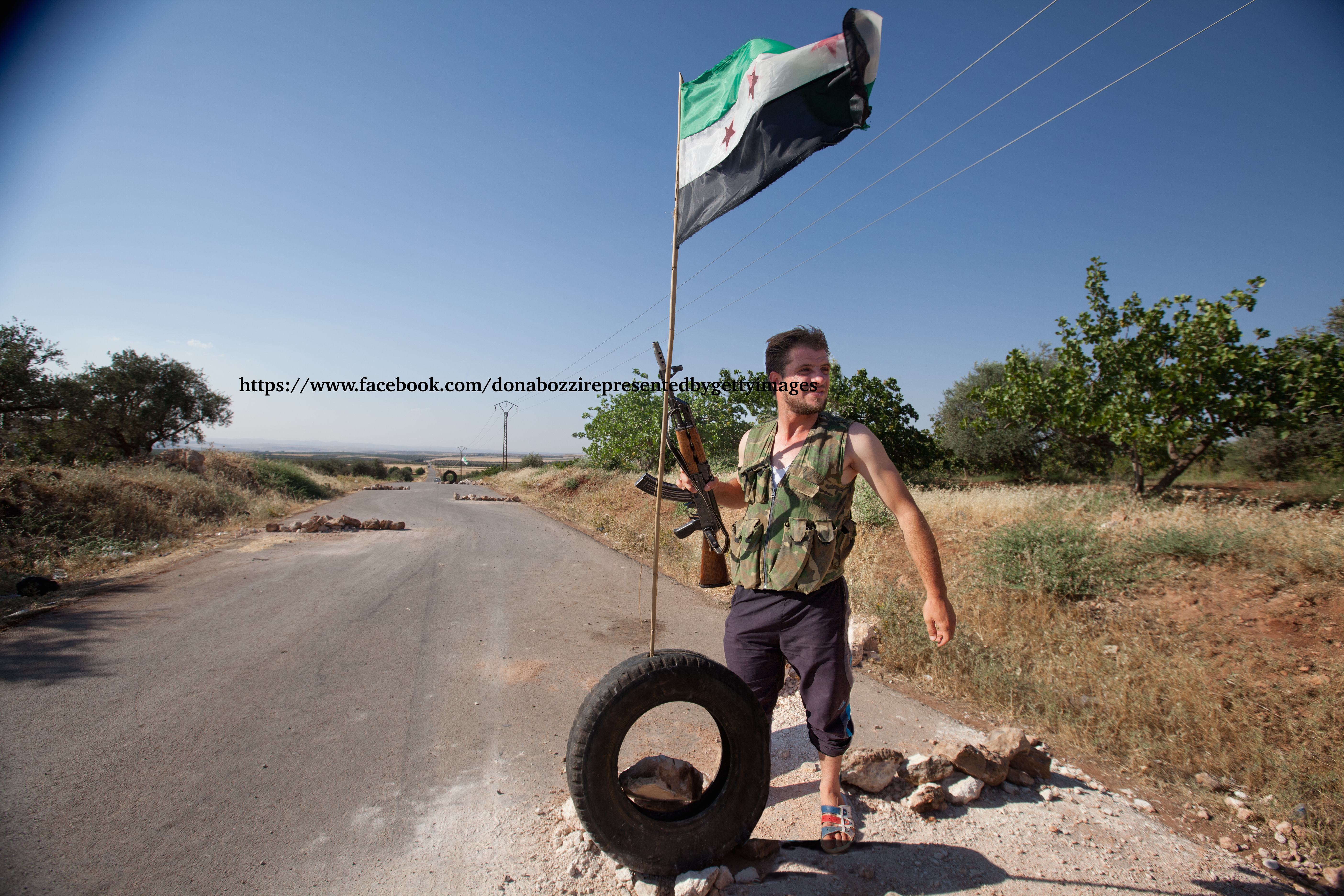
At the break of down, Abu Saleh and Muhammed, the interpreter, came from the “other side” to pick us up, and took us back to Syria, we held hands throughout a span of two miles of muddy no man’s land. In the meantime, a few Syrian motorcycles riding in the opposite way, carried a few people across the “liquid” part of the border, which had no fence, while the Turkish guards turned more than one blind eye from their watchtowers.
Syria, the Idlib province, (Green Land is its meaning), Atmeh and the olives grooves are on the other side of a seemingly endless wire border, which had already been cut, apparently with pruning scissors, and passed through by previous human traffic.
Abu Saleh is also a liaison of Abu Ammar’s, who was coordinating for us from Antakya throughout our trip; as far as dress code, Saleh was ruthless: a black coat, long enough to stumble on it, on top of a heat absorbing second skin were provided by the lady of the house, not a hair wisp was allowed to poke from my hijab.
He took us to visit the FSA operation den: the beardless young men looked, at worse, like disgruntled students, cool quote T-shirts gave away that they weren’t willing to blow themselves up with an explosive belt. Holding on to their kalashnikov, sitting on the couch nonchalant, they seemed to need a gut check, just to prove to themselves they would be ready to step up to “something” coming.
After only two days, Mujahid, third connection of Abu Ommar since we crossed the border, came to pick us up and took us to Meadia, veering alternately to right and left, for four hours, on a span of 300 miles of sickening zigzags, deep into the Idlib province; After Binnish, we gave up remembering the names. Our security, a small pistol on the dashboard, and a “no Bashar here”, reiterated now and then by smiling Mujahid.
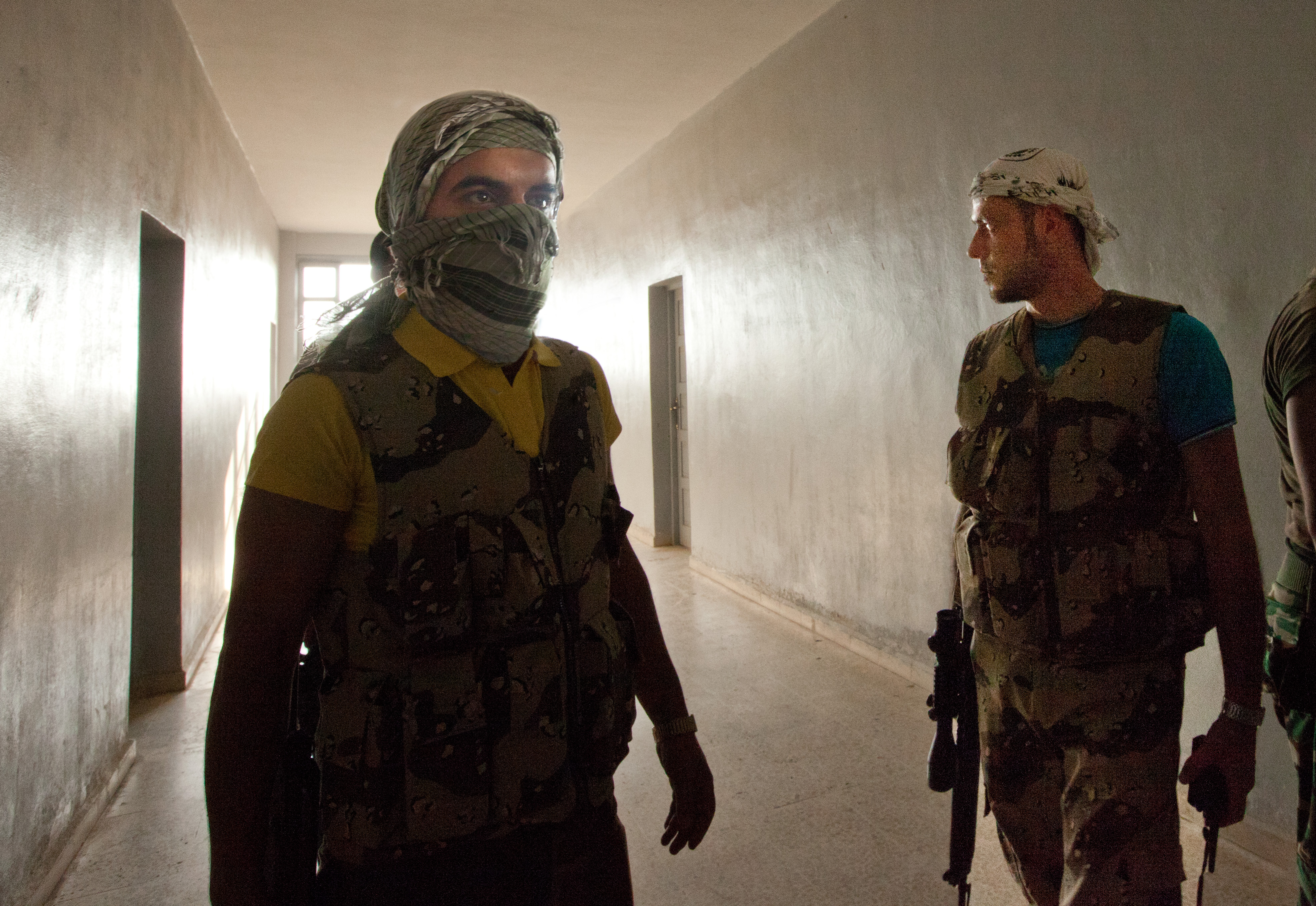
In Meadia, he was the owner of an empty house and a wife, Zehna, and seemed to make a living out of shuttling journalists from Meadia to Homs, and back. The bare floors were covered later in the day with multiple sofa cushions, enough to sleep a mischievous gang of five kids, busy during the day with burning tyres, trying to get smoke into regime pilots’s eyes. Our neighborhood was composed of a wall less house opposite our own. We could see the occupants right inside, a group of young wackadoos busy watching horror movies 24/7, empty beer bottles scattered around the floor. When Zhena would cry over her physical wounds from the regime bombing, we would step out to call for help. Zuher, uncomfortable messenger from across the muddy street, relayed back from the conclave, that was none of our business, and we better stay out of it.
From Meadia we drove to Kfrezeta: Mujahid’s friends recounted stories of houses burned with white phosphorous, used by the regime to ethnically cleanse the Sunni’s houses and their human content. They showed us pictures of charred human flesh, diaphanous pinpoint irides popping out like marbles; like in a previous revolution, the spared from death were eager to show their victims to the visitors, and demanded their dead to go viral for the world to see, hoping helas in vain, that Bashar will get his just deserts.
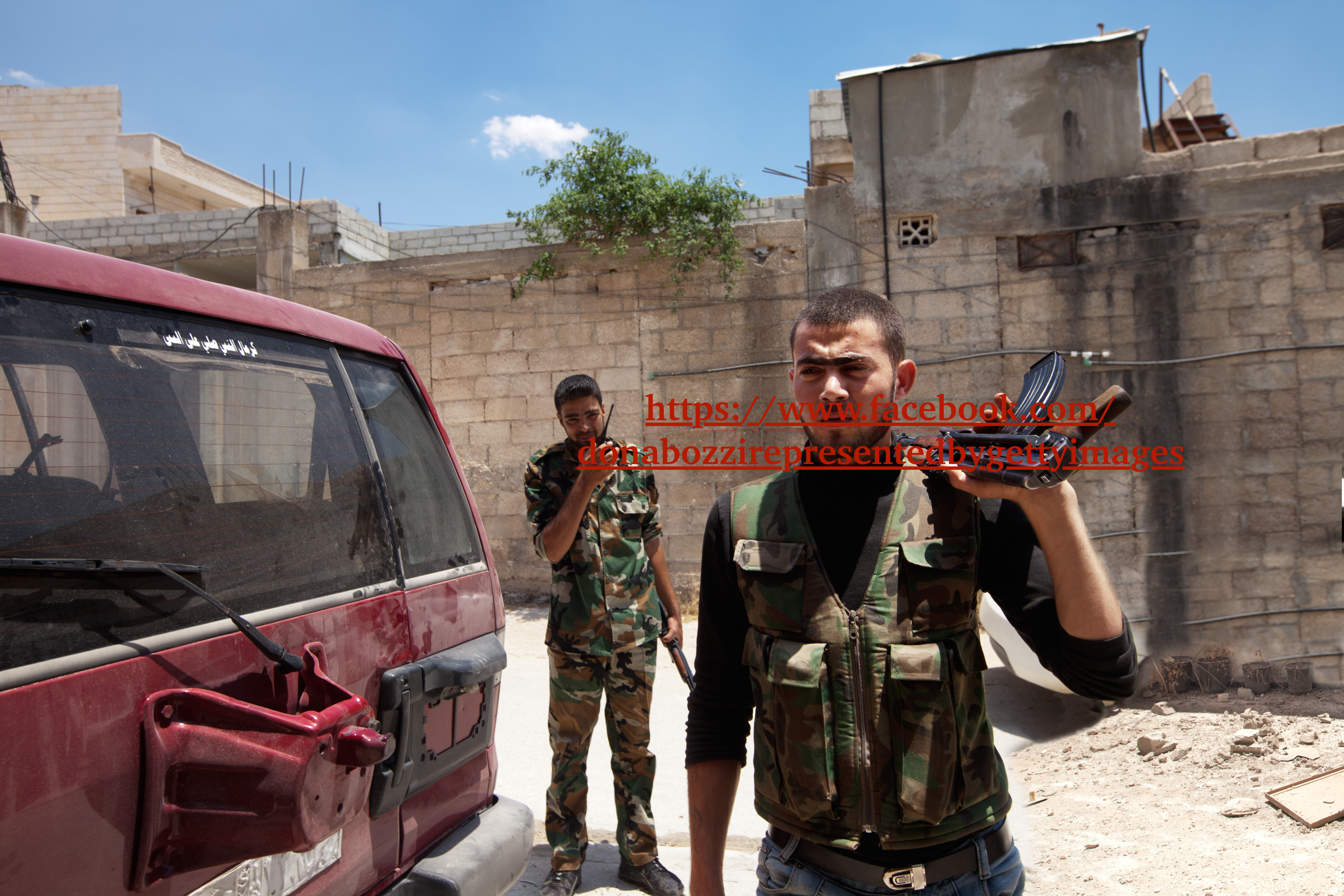
Our host decided that we would be better off in Khan Sheikhoun, a bigger city with, at least in a previous era, a higher standard of living than Kfrzeta. On the dirt road, we pulled over the pick up on the scene of an execution. Our friends requested pictures, luckily we were spared the ethical conundrum, the camera batteries being uncharged due to power rationing on the previous night. Zuher, the interpreter, explained that they generally identify the SAA check points via the executions’ spot, however that wouldn’t apply here, given that the body resulted to have been moved.
His aqua colored face, his sooted body, the bullet hole on his temple, didn’t put a writing on the wall, warning us to make a U turn and go back home. For some reasons death didn’t seem possible for us at that particular moment, as if we could have been able to remain unflappable and prove to suddenly popping up Bashar’s forces that we were tourists, war tourists, or any other kind of yahoos extraneous to the opposition.
Captain Foud Qotiny, 35 years, and Anas Hassao, 40, of the FSA in Khan Sheikhoun, wore the Syrian coat of arms, a shield with two stars, plus one, reassuring us of their identity politics with the opposition. They guaranteed our security throughout the day, by shifts, from the inspections of the shelled areas to the souk, where the smell of zatar still hovered, which we identified to their disappointment as “Syrian oregano”, from the familiar smell.
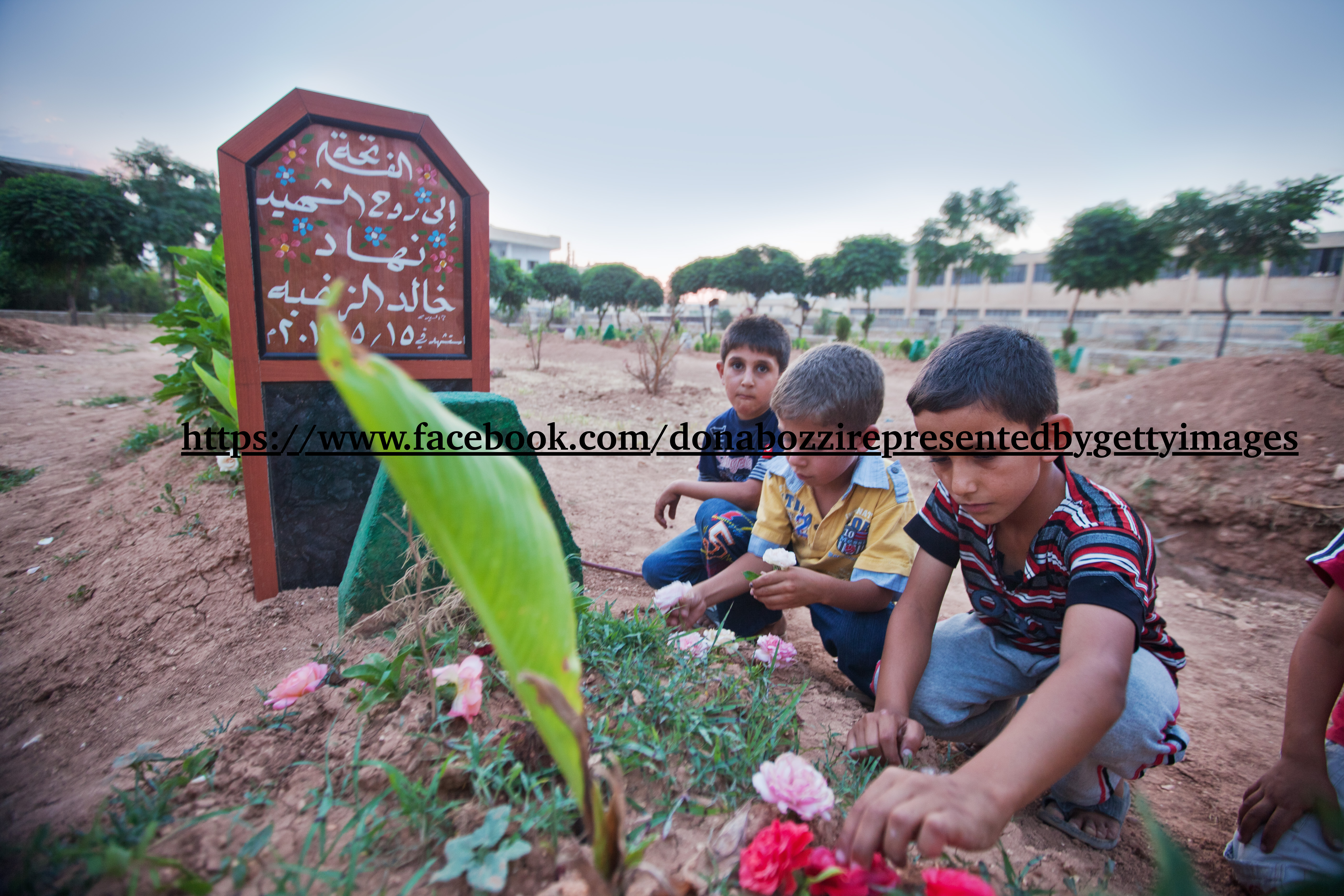
From the way Captain Foud was treating us, it looked as if Khan Sheikhoun had been bypassed by journalists: seeking spiritual compensation through my camera lens, he took us to the destroyed buildings, the houses of the amputated and the wounded, the dead. “The perceived need, the obligation to tell was increasingly urgent” (Glenn Greenwald, No place to hide); to relieve his grief, we assured him with a pang of guilt that we were going to do the media shock and owe.
While hopping from one wobbly stone to another on the top floor of a gutted house, suddenly Hany Souci, Anas’s brother, student of political science in Damascus, whispered: “speed, speed!”, as if he was trying to push us out of the field of view of a telescopic iris. Later that day, the FSA rebels showed us a 14,5 mm bullet coming from a BMT tank, which had killed a man, exactly in the area where we had carried out the inspection.
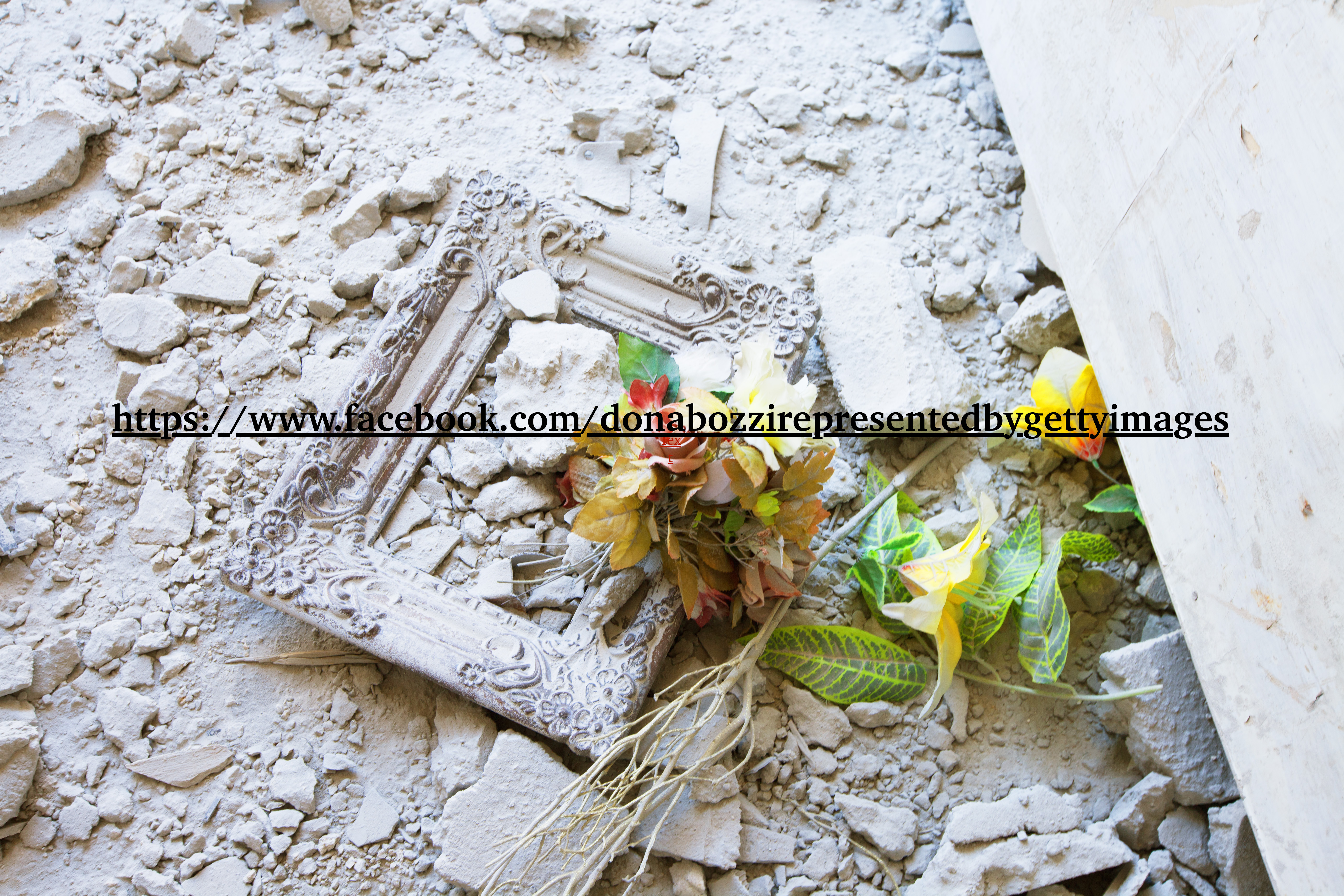
At twilight, we were driven to the Shouhada Khan Sheikhoun cemetery, the monument to the martyrs of 15/05/2012, when 50 city residents were killed in one day by a regime air strike. Three children, unaccompanied, knew exactly what to do: they crouched down, laid flowers on the bare earth covering their friends, then stood up and turned their palms upwards, in prayer, until the awkward eye contact through my lens.
Disturbed by our encroachment on their privacy, they left. A worse abuse than photographing the man killed by execution, which, in the end, we did not do. Feeling like vultures circling on a funeral, we left as well, with that recurring pang of shame.
From Zhena and her daughter we learned to put the soap away and how to eat from hunger: one night Zhena cooked what we called sweet noodles, basically pasta and what she found around the house, sugar; with a stern face, she asked us if we liked it, as if the sweetener was the most natural ingredient for the meal; sharing the extravagance, it was sort of being fed cake by the regime when starving.

From the ladies of the house we also learned to get accustomed to the explosions, they would come after dark from the 82 mm of the T – 72 tanks, and to the snipers’ shots, loud pops, sounding as if they were coming from around the street corner, sometimes from behind the door, when we would stare at each other, in silence. When all that would cease, the young daughters nonchalantly would go back to their computer screen, endlessly staring at the notorious error: “something went wrong”.
Friday, traditionally demonstration day in rebel held cities: our friends warned us that the shabiha snipers, from the rooftops, may be shooting down wholesale at demonstrators: our eyes wide open and looking up, they hardly adapted to the background illumination, thus we marched with wobbly legs and skipping beats to the town square; the older protesters had no banner, just their arms raised, their fists clenched and their loud shouts.
The children held a large banner with the hawk of free Syria, asking “where are the people of the world?” signed by “the people of Khan Sheikhoun”.
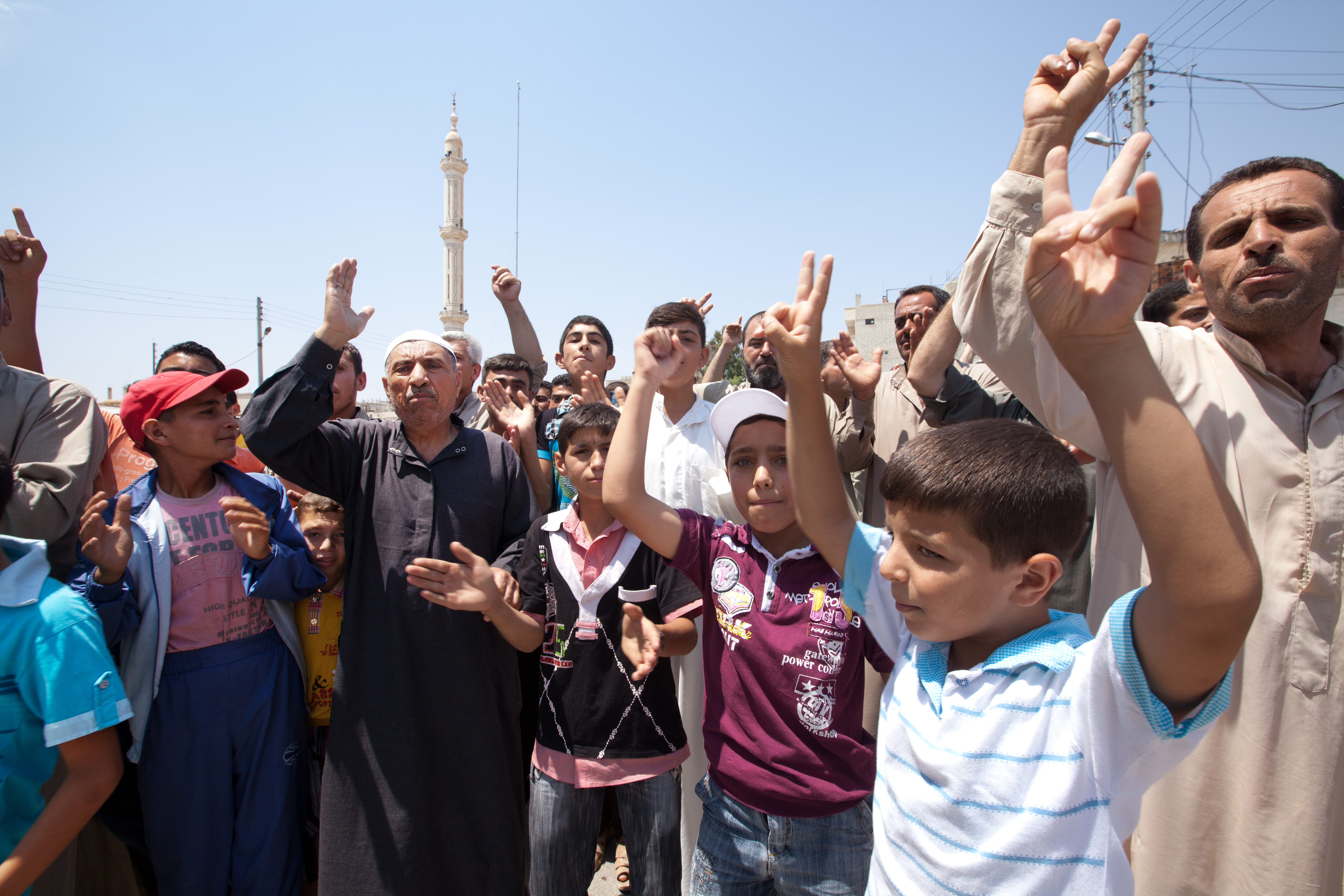
Another banner read ” Arab nations, we will not forgive you!”
Back at home, Hany for the second time in two days, suddenly whispered to us: ”speed, speed!”: we were instructed to pack up and leave. The order came following a message from Abu Ammar, calling his friends from Istanbul. Foud explained that Bashar’s army was about to surround the city, he had to get us out immediately. We jumped in the car, Foud at the wheel, Hany in the front. Crammed on the sides of the back, two men with guns, as if to protect the two of us squished together in the center.
The non lethal assistance promised by the U.S. to the opposition in the previous months must have been in the mail, because captain Foud Qotiny, three stars and the hawk of Qureish on his shoulder, ludicrously didn’t have a satellite phone to verify the road to Meadia, and had to pull over to ask the farmers about the shabiha’s positions.
In two hour, we were back to start at Mujahid’s house in Madaya. He had apologized to Zhena, about leaving her alone, and would still dodge katyusha rockets by zigzaging his pick up back and forth from Meadia to Atmeh on the Turkish Syrian border.
Back in Antakya, the Orontes Hotel manager, as he saw us safe, put his right hand on his heart, to convey relief. On our laptop screen, behind a billowing gunmetal cloud of smoke in Khan Shiekhoun, Hany Souci probably held his aunt Alya tight, to give her courage, trying to stop her pressure from going up, her blood pumping hard through her veins when barrels were dropped from the regime helicopters. A journalist showed up, wondering if Austin Tice of the Washington Post was still alive. Austin, an ex marine, was know by many who hadn’t actually met him because he was rumored to have helped the rebels to take out a shabiha sniper with a kalashnikow, then screaming “hallah uakbar!”. Then he remarked that the story circulating about the CIA was actually true. Feeling off the loop and dumb, we asked what else had the CIA done that we didn’t know about.
Only an hour later, Tom Ashbrook’s on 22/06/2012 On Point mentioned that the CIA was actually “steering guns to the opposition in Turkey”. Most Cia “guns” turned out to be, rather, propaganda: it turned out that the U.S. robocop, was actually sending to the rebels, not much more then MRE, meals ready to eat, repurposed from Afghanistan and Iraq.http://www.bbc.com/news/magazine-33997408
Back at home, via Facebook, ABU Ammar messaged that Mujahid wasn’t shuttling journalists from the Turkish border into Idlib anymore, dodging katyusha rockets with his sharp zigzagzs.